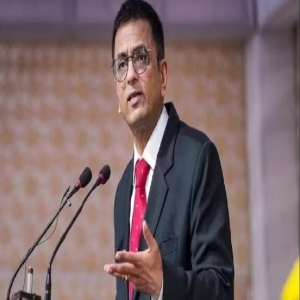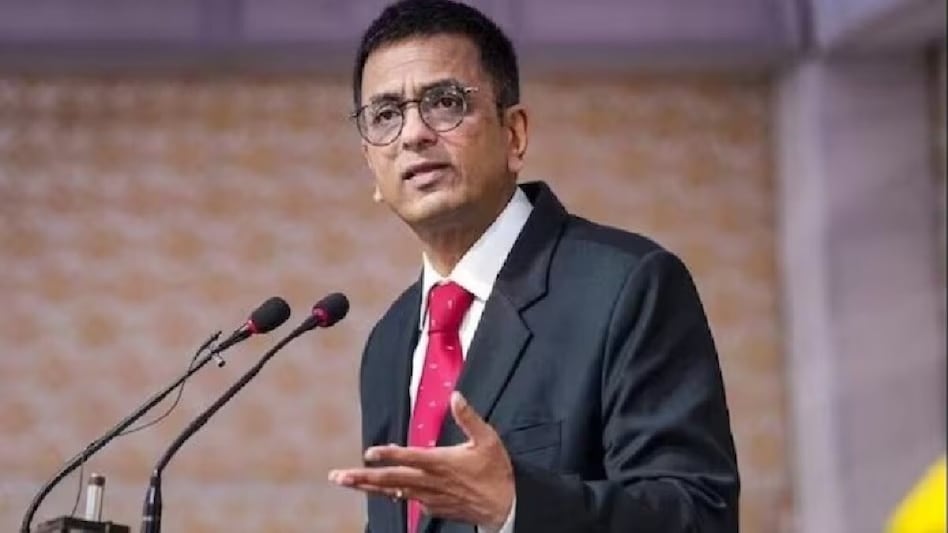
.jpg) Aakash
Aakash

Justice DY Chandrachud may find solace in god's guidance, but history may judge his tenure differently. From Ayodhya to electoral bonds, his tenure as Chief Justice of India (CJI) reveals an apparent devotion not to impartial justice but to an often selective use of religious and political connections. By snarling his decision-making with a claimed divine influence, Chandrachud has evoked a powerful reaction in the public consciousness. That reaction, unfortunately, does not favour him but actually questions the integrity and secular foundation of the office he represents.
To grasp the weight of Chandrachud's actions, consider the seismic Babri Masjid judgment. The CJI reportedly relied not on pure judicial reasoning but on "divine enlightenment." In doing so, he fashioned himself as a modern-day arbiter of faith, with judgments that many see as deeply coloured by political alliances and religiosity rather than constitutional law. The subtext of his conduct suggests a man, by some accounts, "suffering from delusions of grandeur"—believing his judgments to be divinely sanctioned, thus shielding them from critique and immune to constitutional scrutiny.
This erosion of judicial impartiality has led many to claim that Chandrachud has "seriously eroded the office of the CJI and the image of the Supreme Court," a legacy that casts doubt on the future of a judiciary bound by secular and egalitarian values.
The Ayodhya judgment, according to Chandrachud himself, was not simply adjudicated through earthly interpretations of law. Rather, it was divinely inspired—a notion that has stirred profound concern. Historically, godly justification has been used by authorities to legitimise morally questionable acts, from the Crusades to colonial conquests to jihads, where divine will was wielded to justify subjugation. When Chandrachud invoked god's guidance for his decision to allocate land for the construction of the Ram temple, he effectively sanctioned a religious entity over a criminal act—the destruction of a mosque.
This is the irony many in the public, particularly those who believe in secular justice, find hard to digest. Justice Chandrachud's choice to see "divine intervention" as the solution to Ayodhya's turbulent history reads not as judicial strength but as an escapist narrative. It brings to mind the historical precedent of invoking religion to mask coercion or justify injustices that could not stand up to secular legal standards.
Now approaching the twilight of his tenure, Chandrachud has voiced concern over how history will remember him. Such concerns, however, seem to have had taken a back seat during his more controversial rulings. Under Chandrachud's watch, accountability faltered, and the judiciary seemed increasingly in step with the executive's rhythm, drawing accusations of eroding democratic transparency.
By allowing a questionable government to stay in power despite acknowledging its questionable rise to office, Chandrachud has etched a legacy that, to many, reeks of complicity with political forces. This was highlighted most jarringly in cases like the Maharashtra government's constitutional crisis. Justice Chandrachud recognised the constitutional overreach but allowed the compromised government to stay—a curious decision in a supposedly impartial judiciary.
Justice Chandrachud's public persona only amplifies these concerns. His choice to be seen at religious ceremonies with political figures, such as a puja with Prime Minister Narendra Modi, did not project the image of a secular justice. Rather, it showed a man willing to perform religious acts side-by-side with politicians, reinforcing suspicions that the judiciary under his leadership was cosy with the executive.
One might argue that Chandrachud is entitled to his personal beliefs, but the line between private faith and public duty becomes perilously thin when his personal beliefs seem to influence landmark judgments. In a secular judiciary, the Chief Justice's visible association with powerful figures in religious settings only deepens suspicions of compromised impartiality.
CJI Chandrachud's tenure has been marked by selective justice that, many argue, disproportionately targets those out of favour with the ruling elite. The continued detention of young activists like Sharjeel Imam and Umar Khalid—who remain incarcerated for the "crime" of dissent—has left many questioning the balance of justice. Activists and academics like Father Stan Swamy, who died in custody, serve as stark symbols of what some call Chandrachud's selective application of justice.
The spectre of Bhima Koregaon, a case involving violence between Dalits and upper-caste groups, hangs particularly heavy, especially with revelations that evidence against those detained was likely fabricated. Despite these grave indications, Chandrachud's court refused to release the accused, effectively endorsing the executive's narrative. The Bhima Koregaon case is a significant example of Chandrachud's court allegedly endorsing the executive's narrative, rather than upholding the principles of justice and fairness. Chandrachud's legacy is thus likely to be remembered not as a chapter of impartial justice but as a period when the judiciary shielded the executive's dubious actions under a veil of selective rulings.
Many have noted Justice Chandrachud's apparent sense of grandeur as if he were beyond reproach. Far from inspiring public confidence, his statements evoke "vilification and ridicule" in a country where millions seek a judiciary that transcends personal and religious biases. To cloak decisions in the mantle of divine approval is to assert a higher authority that not only undermines the Supreme Court but also erodes public faith in a secular judiciary.
In his quasi-messianic approach, Justice Chandrachud has carved an image of the judiciary that is dangerously personalised. The office of CJI is not meant to be a platform for one's spiritual revelations; it is a position that demands the humility to adhere to constitutional law without succumbing to the lure of grandeur.
Chandrachud's tenure will not easily be forgotten, but for reasons he might not like. As one of the CJI's many "milestones," his role in the Gyanvapi Mosque survey stands as a testament to his willingness to entertain petitions that many see as feeding into divisive narratives. By allowing such surveys, Chandrachud paved the way for public sentiment to be manipulated in favour of those who seek religious division over unity. For a Chief Justice to prioritise curiosity over constitutional duty was a decision that rang hollow with many who still hold faith in a secular legal system.
As Justice Chandrachud prepares to retire, his legacy appears inextricably linked with that of a judiciary bending to the will of an assertive executive. While he may hope that his spiritual convictions will redeem his decisions in the eyes of history, the constitutional faults they exposed will likely outlast his time in office.
For this reason, Chandrachud's departure may serve as a cautionary tale about the dangers of conflating personal faith with judicial duty. This chapter in the judiciary's history underscores a profound deterioration of secularism in a position once revered as the epitome of impartial justice.
As Justice DY Chandrachud steps down, he leaves behind a judiciary that has wavered under the weight of his beliefs and his judgments. By all accounts, his legacy will be remembered not as a beacon of impartial justice but as an era of selective jurisprudence, marred by a perceived capitulation to political influences. History will not look kindly upon a CJI who invoked divine intervention to justify decisions that many view as morally and constitutionally untenable.
Justice is meant to be blind, and when those at the highest echelons of power lift that blindfold to peer through the lens of personal belief or political convenience, they expose an entire system to corrosion. For a CJI who claims to worry about his legacy, Chandrachud has left a record that speaks louder than any divine justification. This record will stand as a reminder of what happens when personal convictions overshadow constitutional fidelity.